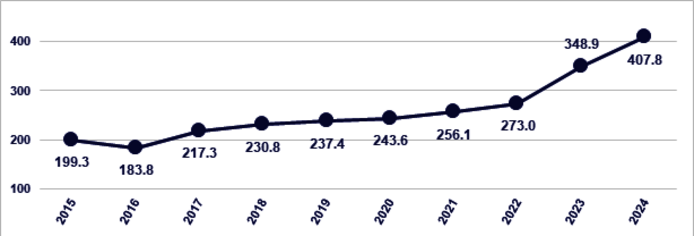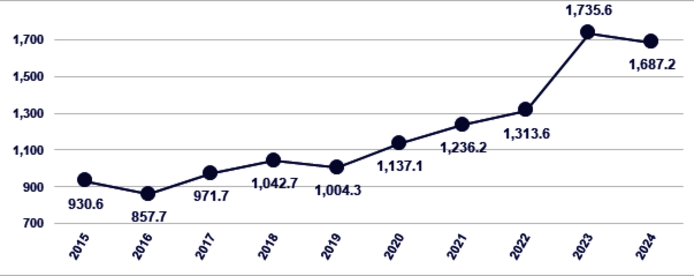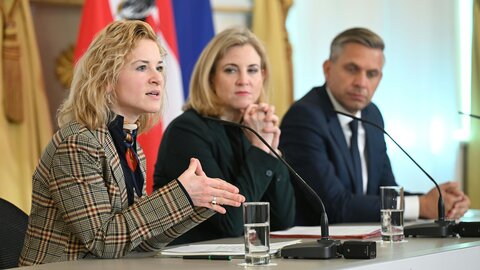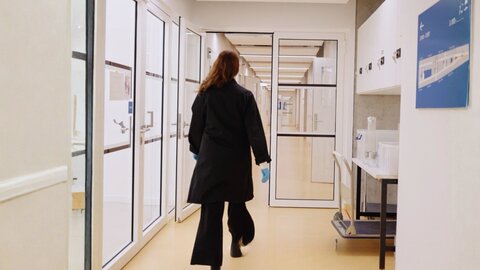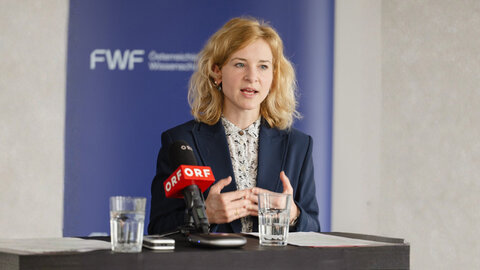Research That Matters: FWF Projects Provide Impetus for the Economy and Society
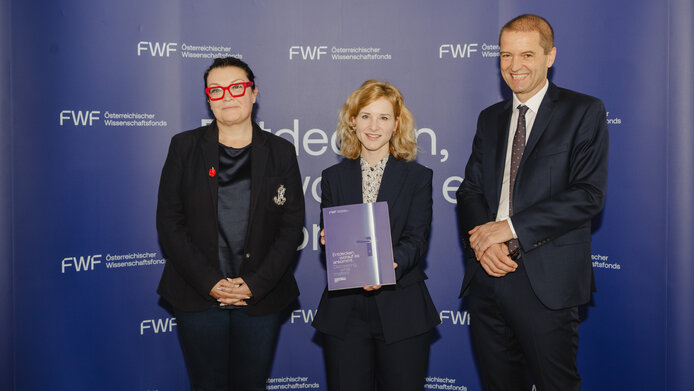
Austria’s basic research is growing stronger, with more projects, more researchers, and more results: In 2024, the Austrian Science Fund (FWF) invested €408 million in new projects, up from €349 million in the previous year. Around €172 million went to research in the field of natural sciences and technology, €160 million in biology and medical sciences, and €76 million in the humanities and social sciences. The demand for research funding remains strong: The volume of funding applied for by researchers stayed high at just under €1.7 billion.
In total, the FWF is currently funding over 5,000 researchers at Austria's universities and non-university research institutions – a new record that highlights Austria’s outstanding scientific potential and the importance of FWF funding for the success of cutting-edge research. The FWF’s highly competitive grants play a key role in developing excellent academic performance, boosting economic growth, strengthening competitiveness, and tackling social challenges.
Minister of Science Eva-Maria Holzleitner says, “Austria has a long tradition as a country of innovation, education, and scientific excellence. However, these achievements cannot be taken for granted – they must be actively protected and encouraged. Freedom in research and science are the foundation for progress, prosperity, and social stability. Defending these values is an investment in the next generation. Through its successful funding programs, the FWF proves that investing in research is investing in our future.”
“Science and research are indispensable for a modern society – they ensure medical advances, modern technologies, and better education, and offer solutions to the climate crisis and social and cultural issues. With FWF funding, we give thousands of researchers in Austria the opportunity to make new discoveries. This has stimulating effects in many areas of the economy and society. By continuing to invest strategically in science, Austria is strengthening the country as a research and business location, creating prospects, and assuming responsibility for future generations,” said Christof Gattringer, President of the FWF, while presenting the annual results.
“The funding balance contains two key points – Austrian basic research and the attractiveness of Austria as a research location are growing, and with them, the number of excellent researchers applying for FWF funding. As a result, the funding pressure remains high as demonstrated by the numerous projects that are ‘approved but not funded.’ For the future, it is important not to let up and to continue investing in highly innovative cutting-edge research, as recommended by international studies such as the Draghi Report or national analyses by WIFO and IHS,” summarizes FWF Vice-President Ursula Jakubek.
Find out more
Focus on excellence pays off: As potential increases, so does funding pressure
National and international researchers submitted around 2,800 funding applications with a volume of almost €1.7 billion in 2024. With the 683 new projects, funded with a volume of €407.8 million, the average approval rate across all funding programs fell to 24.4% (2023: 26.3%). The high level of excellence is also evident in a further area: Based on the last five years, the FWF is unable to fund research projects worth an average of around €63 million each year, despite their outstanding scientific quality. That means that these excellent “approved but not funded” research ideas will never be implemented in Austria.
Progress has been made but momentum must be maintained
The funding balance was presented in the middle of the current funding agreement term 2024-2026. The FWF has successfully set a number of new priorities during this term, including the next round of Emerging Fields funding as part of the excellent=austria initiative for inter-institutional collaborations. Another component is the awarding of the first new FWF ASTRA Awards for highly talented postdocs. Due to the high potential for excellent cutting-edge research in important forward-looking fields, the FWF will also advocate the funding of a new round of calls for the Clusters of Excellence and a generous FTI (Research and Technology Initiative) Pact for the 2027-2029 period.
Excellence initiative in full swing
Additional Clusters of Excellence and the first Emerging Fields projects were approved in 2024 as part of the federal government’s excellent=austria initiative, intended to expand cutting-edge research at universities and non-academic research institutions. €75 million are going to the Clusters of Excellence, and the Emerging Fields are receiving €31 million in funding. The four new Clusters of Excellence are advancing basic research in the areas of brain research, healthy aging, artificial intelligence, and materials research, while the five Emerging Fields are focusing on high-risk research topics with particular potential for innovation: global security of supply, tumor therapies, evolutionary research, neurological research, and new approaches at the interface of mathematics and relativity theory. The selection process for further Emerging Fields, with approvals scheduled for March 2026, is currently in progress.
Funding for all areas of modern cutting-edge research
In addition to the large-scale research networks funded by the excellence initiative, the FWF continues to fund the entire spectrum of scientific disciplines at all career levels, including flexible project funding at national and international level (€187.2 million), early career and career development funding (€74.3 million), dedicated collaborative research projects (€39.6 million), and communication and citizen science funding (€0.9 million). Special programs such as Arts-based Research, Clinical Research, doc.funds or the Special Research Areas financed by the Fonds Zukunft Österreich strengthen a diverse and broad-based research landscape.
Over 5,000 people employed in FWF projects throughout Austria
Together with the newly approved projects, a total of 2,521 FWF-funded research projects were active by the close of 2024. This includes 5,006 researchers at universities and other institutions, 47.2% of whom are women. It is particularly noteworthy that almost 70% of them are junior researchers (35 years or younger). This confirms the important role the FWF plays in training the next generation of top researchers. The FWF's career programs in particular are instrumental in training junior researchers and preventing brain drain. The FWF is conducting a survey within the scientific community to help it tailor its services to the needs of researchers in a changing scientific world, and the results will be published in the fall of 2025.
Attractive funding options for incoming researchers
For many years, the FWF’s funding programs have been designed to attract the best national and international researchers. This includes, for example, the ESPRIT career program, which has a particularly high percentage of researchers with international backgrounds – for almost half of all ESPRIT-funded researchers, FWF funding was a key factor in their decision to move to Austria and develop their academic career here. The FWF expects the new FWF ASTRA Awards for advanced postdocs to include an equally high number of incoming researchers who have most recently worked at a research institution abroad. In addition to these two programs, the FWF’s Principal Investigator Project funding offers the flexibility and freedom needed to implement pioneering projects in all disciplines of basic research.
Further Fonds Zukunft Österreich projects set to launch
The FWF used funds provided by the Fonds Zukunft Österreich to fund three large-scale Special Research Areas (€11.8 million), three Research Groups (€4.4 million), and eight doc.funds and doc.funds.connect consortia (€16.2 million) with 65 new doctoral positions, as well as several matching funds grants with the federal states. In cooperation with the Austrian Academy of Sciences, the FWF has also implemented the Disruptive Innovations – Early Career Seed Money program, with a total of €2 million in funding for 30 researchers in the early stages of their careers. The cooperation with Fonds Zukunft Österreich is crucial for the FWF, which is why it applied for funding from this key source again in 2025.
International peer review by the world’s leading researchers
International quality standards determine how the FWF awards funding – the only criterion for funding is scientific excellence. In 2024, the FWF commissioned some 5,000 international reviews from over 60 countries, with most of the reviews coming from researchers in the USA, Germany, and the UK.
Impact at all levels: Incoming researchers, start-ups, discoveries
The effects of FWF funding are diverse and can be seen in both short- and long-term impacts. Minister of Science Eva-Maria Holzleitner and FWF President Christof Gattringer were joined at the presentation of the funding balance by three researchers, who talked about the importance of FWF funding. Indian geologist Anindita Dey, who came to the University of Vienna from the University of Delhi on an ESPRIT career grant in 2024, emphasized the relevance of FWF funding for her decision. Microbiologist Birgit Mitter is an example of the successful transfer of findings from basic research into practice. Twenty years ago, her FWF-funded research laid the scientific foundation for the subsequent establishment of a successful spin-off, and she was awarded two Phoenix Founders’ Awards this year. And Michael Wagner, microbiologist at the University of Vienna and Director of Research of a Cluster of Excellence, gave an up-to-date insight into the work being done and the impact of this funding, speaking on behalf of the hundreds of researchers involved in the Clusters.
